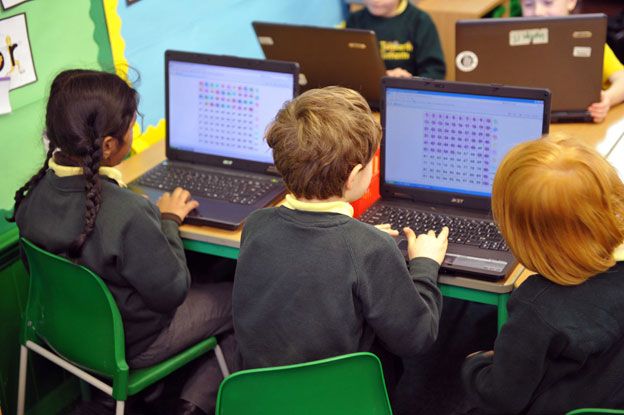A computing revolution in schools
- Published
- comments

This is the week when a revolution begins to sweep through schools in England. It involves a whole new way of teaching children about computing - but I suspect many parents, and even some teachers, know very little about this important moment in education.
As children from five upwards return to school, they are going to have to start learning how to program - or to "code" to use the trendy term which seems to upset some old-school programmers. This is the result of the new national curriculum for computing that is being introduced in England this term.
In the words of the curriculum document, the aim is to "ensure that all pupils can understand and apply the fundamental principles and concepts of computer science". Before considering just how well-placed schools and teachers are to make this happen, it is worth remembering how we got here.
It is just four years since two leading figures in the games and visual effects industries produced a document calling for a transformation in the way computing was taught in the UK. Ian Livingstone and Alex Hope's Next Gen report was sparked by concerns that their industries were not succeeding in finding the skills they needed to prosper.
But, aside from their practical business needs, their vision of a much more creative and in-depth computing education chimed with the concerns of many pupils - and some teachers - about ICT teaching. This subject had fallen into disrepute in many schools, seen as a fairly undemanding course in office - or rather Microsoft Office - skills, which would not help you get into a good university or a decent job.
Some ICT teachers believe that criticism was overdone and that what happened next - the sweeping away of the existing curriculum - was too hasty and pushed the entire subject of computing even further down the pecking order.
What is clear is that the Next Gen report, coupled with a groundswell of discontent from some teachers and computing professionals, turned into a very effective campaign - and made the government take action.
The new curriculum is not just about programming - indeed one frustrated secondary school teacher told me on Twitter "coding/programming/whatever you call it is ONE THIRD of the new Computing Curric- & 7/8ths of the fuss!!" He insisted that there would be no revolution in most secondary schools as they were already doing much of the work, but it would be far more daunting for primary schools.
I'm not sure about that - at one excellent secondary school I visited recently, ICT teachers appeared confused when I asked about computing and pointed me towards the work pupils were doing learning how to use PowerPoint.
But it is even more clear that at the primary level, this could be a challenging term. Among the requirements for what Key Stage 1 pupils - that is 5-to-7 year olds - should be taught are the following:
- understand what algorithms are, how they are implemented as programs on digital devices, and that programs execute by following precise and unambiguous instructions
- create and debug simple programs
- use logical reasoning to predict the behaviour of simple programs
That sounds quite daunting, but different schools will set about it in different ways, some setting aside separate computing lessons, others weaving these ideas through the school day. And there will be plenty of support from eager volunteers who have already set up a myriad of clubs in schools, some teaching children how to make mobile apps, others introducing the Raspberry Pi and similar cheap computing devices.
The BBC is also announcing today some new programmes and teaching resources across CBeebies, CBBC and Bitesize to get children interested in computing. This is an early taste of a major digital creativity initiative which will get underway in 2015, with the aim of getting adults as well as children engaged in computer programming and the use of various new technologies. Watch this space..
There are bound to be teething troubles as schools get to grips with this new approach to teaching about computers. But we should not lose sight of the long term aim - which is not necessarily to produce a nation of Mark Zuckerbergs. Only a minority of children will have any great interest in or aptitude for coding, just as only a few will want to become mathematicians.
But most of them will need to understand something about how computers work and just about all of them can enjoy the creative possibilities that digital technology offers. If we can show a new generation how to be the masters not the servants of the machines of the future, then that is a prize worth winning.